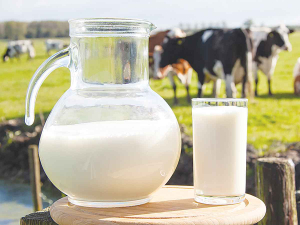New Zealand scientists pioneer fermentation to unlock multimillion-sollar shiitake export market
Could a breakthrough in fermentation create a new multi-million-dollar export market for shiitake mushroom extracts into China?
 New research from the Riddet Institute has revealed new insights into Chinese dairy consumption habits.
New research from the Riddet Institute has revealed new insights into Chinese dairy consumption habits.
Recent research has provided new insights into Chinese dairy consumption.
The research, part of the Riddet Institute’s NZ Milk Means More research programme, surveyed 1,000 Chinese milk consumers aged between 45 and 75 residing in the mega-cities of Beijing, Shanghai, and Guangzhou along with the two smaller provincial cities of Chengdu and Shenyang.
Dr Ao Chen, who was responsible for the project, says traditionally, milk has not been a staple in the Chinese diet. “However, over the past two to three decades, there has been a significant increase in its consumption,” Chen told Dairy News.
He says that, initially, a lack of cold chain distribution and home refrigeration led to the popularity of UHT milk across the country, but the growing interest in imported milk – often in a powdered format – has boosted powdered milk consumption in the city of Guangzhou.
“The consumption of pasteurised milk, on the other hand, has largely depended on the development of domestic dairy manufacturers in various regions.”
Chen says successful examples of this include Sanyuan Foods Co. Ltd in Beijing and Bright Dairy & Food Co. in Shanghai, the latter of which is a significant shareholder of Kiwi dairy company Synlait.
“Consuming dairy requires a changed mindset, and new ideas and exotic foods and drinks tend to be adopted first in the big cities where people are more open-minded and affluent,” Chen says.
The latest Global Dairy Trade auction results have delivered a boost to dairy farmers.
New Zealand potato growers are prioritising value creation from high yields to meet a complex mix of challenges and opportunities, says Potatoes NZ chief executive Kate Trufitt.
A Hawke's Bay apple orchardist supports the Government's objective of doubling exports but says this won't happen in the horticulture sector unless there's a change in the process for bringing new plant material into the country.
Canterbury arable farmers are down by tens of millions of dollars after a rollercoaster of wild changeable January weather saw harvests delayed and some crops destroyed by violent hailstorms.
Could a breakthrough in fermentation create a new multi-million-dollar export market for shiitake mushroom extracts into China?
Meadow Fresh has created the world's first fantasy sports league powered by real cows.
OPINION: Fonterra may be on the verge of selling its consumer business in New Zealand, but the co-operative is not…
OPINION: What does the birth rate in China have to do with stock trading? Just ask a2 Milk Company.